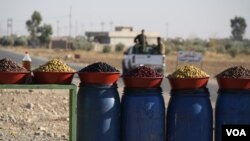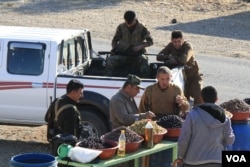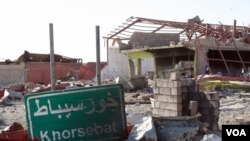“For two years I couldn’t get to those trees,” says Issa, 24, pointing to a fading patch of olive trees at the base of a nearby mountain. “But now I water them and they will come back. Olives are strong.”
The mountain, he explains, was held by Peshmerga forces while his Iraqi village was held by Islamic State militants. Local people were not allowed too close, lest they attempt escape.
Two weeks ago, Peshmerga took Bashiqa after a bitter three-day battle, but homes and roads are still being cleared of booby traps and bombs.
Like Bashiqa, most of the re-captured region surrounding Mosul is largely a wasteland, with houses and businesses bombed out or in rubble, and left empty with the sound of ripped up tin flapping in the wind.
But along the roads, mostly only traveled by soldiers, sellers like Issa serve olives out of metal bowls, and olive oil in used water bottles. It appears to be the only commercial business that has survived in this area north and northwest of Mosul.
When Islamic State was in charge, the sellers say they sold olives and oil from the trees they could access to IS militants, the only people who could afford the luxury. Even then, militants paid a fraction of the normal price for the regions’ most famous products.
“When IS was here we were selling these for 500 to 600 Iraqi dinars (about 50 cents) a kilo,” says Samer at his stand near Khorsebad, a village shattered beyond repair. “Now we sell the same for 6,000 dinars (about $5).”
Historically a symbolic of peace, civilization and oath keeping, for these farmers, olive trees symbolize something far more pressing: a chance to rebuild their lives from the literal ashes IS left as they fled.
Customers are usually Peshmerga forces and occasionally Iraqi soldiers going to and from Mosul, about 30 minutes away by car. Most civilians are not allowed to pass through checkpoints into what is still considered a war zone.
“All the people in my village depend only on this business,” says Issa, who is supporting his wife and four children on his olive sales. “And the Peshmerga soldiers all know we have the best olives.”
Surviving but badly damaged
Neglected olive trees, says Gosum, who owns a now badly damaged shop outside of Bashiqa, will take three years to bear fruit if they are regularly watered again. Once a prominent bulk-fruit farmer, his other fruit trees may be permanently damaged and he sells olives in small plastic bags to feed his 13 children.
In the mean time, the local population is also trying to recover from the physical and psychological damage inflicted on them under IS, and in the recent battles.
When Peshmerga soldiers surrounded IS here, cutting Mosul supply lines, they also cut electricity that was coming out of Mosul. And when the battle ensued, most of the people in the area that remained were in a village at the base of the mountain, directly between the IS front lines and Peshmerga.
“It was very dangerous because we were in the middle of it,” he explains.
A few kilometers down the road, Issa climbs the stairs of a building once used as a sniper nest by IS. One farm below is burned to the ground, with only the skeletons of olive trees remaining. The farmer was also a Peshmerga fighter, and fled IS territory as soon as he could.
“If you left the area, IS took everything,” says Issa.
In the building next door “Long Live the Islamic State” is still scrawled on the wall in Arabic.
“Music was forbidden, shaving was forbidden and our trousers had to be short,” Issa tells of IS rule. “They would listen at our doors to see if we were talking on mobile phones. If you saw an IS militant, you would be terrified.”







